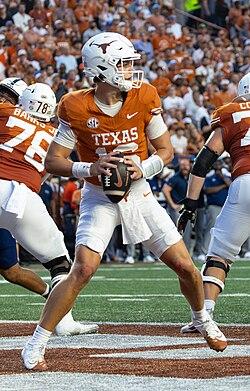Arch Manning’s Sideline Incident Sparks Debate on Sportsmanship and Player Conduct
Mother and Referee Step In After Arch Manning’s Controversial Celebration
During a recent matchup against Sam Houston State, Arch Manning not only impressed with his touchdown but also attracted attention for his post-score behavior. After scoring, Manning briefly stood over a defender from the opposing team, a gesture that quickly drew criticism. Notably, his mother voiced her disapproval from the sidelines, emphasizing the importance of humility and respect in sports. Simultaneously, the game official approached Manning to remind him of the league’s expectations regarding player conduct, reinforcing the need for professionalism on the field.
This episode underscores the challenges young athletes face in balancing competitive passion with respectful behavior. Key takeaways from the reactions include:
- Family Influence: The role of close relatives in shaping an athlete’s character and sportsmanship.
- Official Oversight: The responsibility of referees to uphold fair play and prevent provocations.
- Player Awareness: Recognizing how celebrations can be perceived by opponents and spectators.
| Respondent | Core Message |
|---|---|
| Mother | Promote humility |
| Referee | Maintain sportsmanship |
| Manning | Balance enthusiasm with respect |
Understanding Sportsmanship Expectations in College Football Celebrations
Following the game, the focus shifted from the scoreboard to the conduct displayed during celebrations, igniting a wider discussion about sportsmanship norms in collegiate football. Arch Manning’s act of standing over an opponent after scoring was met with swift criticism, highlighting the ongoing tension between expressing joy and respecting competitors. This incident brings to light the often unspoken rules that govern player behavior during emotionally charged moments.
Sports analysts point out that while the boundary between spirited celebration and unsportsmanlike conduct can be subjective, it remains vital for preserving the game’s integrity. Important considerations include:
- Respecting Opponents: Celebrations should avoid humiliating or disrespecting other players.
- Officials’ Responsibilities: Referees must strike a balance between allowing players to enjoy their achievements and enforcing decorum.
- Coaching Guidance: Coaches play a crucial role in setting behavioral standards that reflect positively on their teams.
| Focus Area | Primary Concern |
|---|---|
| Player Behavior | Balancing passion with respect |
| Referee Enforcement | Applying penalties for unsportsmanlike actions |
| Coaching Influence | Establishing clear conduct expectations |
How Sideline Behavior Shapes Team Image and Athlete Growth
The episode involving Arch Manning’s sideline conduct, coupled with the immediate reprimands from his mother and the referee, highlights the fine line athletes must tread between competitive drive and respectful demeanor. Such incidents can significantly influence public opinion, affecting not only the individual player’s reputation but also that of the entire team. Unsportsmanlike actions risk casting a shadow over coaching philosophies and program culture, often attracting negative media scrutiny and fan backlash.
Sideline conduct impacts several critical areas:
- Team Reputation: Poor behavior can damage a program’s image, hindering recruitment efforts and alienating supporters.
- Player Development: Repeated misconduct may foster detrimental habits that impede personal and athletic growth.
- Leadership and Discipline: Coaches must address inappropriate conduct swiftly to uphold team standards and accountability.
| Area | Effect |
|---|---|
| Fan Support | Erosion of trust and enthusiasm |
| Media Attention | Increased critical coverage and scrutiny |
| Team Morale | Potential decline in cohesion and focus |
Strategies for Coaches and Players to Uphold Professionalism Amid High-Stakes Moments
In the heat of competition, maintaining composure and respect is essential for both players and coaching staff. Emotional reactions, such as standing over an opponent after scoring, can escalate tensions and attract negative attention from officials, fans, and media outlets. Coaches should prioritize teaching emotional regulation and humility, leading by example to foster a culture of professionalism within their teams.
Effective approaches to sustaining professionalism include:
- Encouraging celebrations that honor achievements without belittling opponents.
- Conducting pre-game briefings to clarify behavioral expectations during intense moments.
- Training referees to manage unsportsmanlike conduct with tact and consistency.
- Equipping players with mental tools to control emotions and defuse potential conflicts.
| Professionalism Focus | Recommended Practice |
|---|---|
| Player Behavior | Demonstrate respect; avoid provocative gestures |
| Coaching Leadership | Exemplify calmness; reinforce conduct standards |
| Referee Actions | Address violations promptly and impartially |
| Emotional Management | Utilize psychological techniques to maintain focus |
Final Thoughts
Amid growing attention on Arch Manning’s collegiate career, his recent touchdown celebration and the subsequent admonishments from his mother and the referee highlight the nuanced balance athletes must strike between passion and respect. As Manning continues to evolve as a player under the public eye, this episode serves as a crucial reminder that conduct on the field can influence reputation as much as athletic performance. How he adapts to this feedback may prove as significant as his skills in shaping his future in college football.




